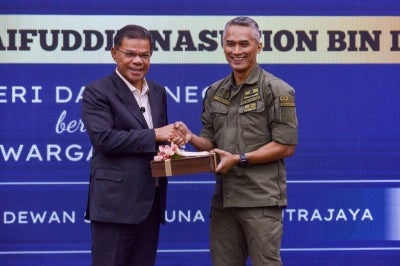Can Malaysia adopt Estonia's digital governance and AI readiness?
Estonia, is ranked as the country with the most tech-savvy society in the world.

DUBAI - During the recently-concluded World Government Summit (WGS 2024) here, Estonia, a country in Northern Europe, captivated the attention of this writer for its digital governance and public services delivery.
Estonia, formerly part of the Soviet Union, is ranked and highlighted by world organisations like the World Economic Forum (WEF), the United Nations (UN), and the European Commission as the country with the most tech-savvy society in the world.
It is reported that the governance system in the nation of 1.3 million people works on digital platforms. Among other services, taxes can be completed online in under five minutes, 99 per cent of Estonia’s public services are available on the web 24 hours a day, and almost one-third of its citizens vote via the internet.
Kristina Kallas, the Minister of Education and Research for Estonia, disclosed to BERNAMA that their country's transformative digitalisation journey began 24 years ago and is now integrating artificial intelligence (AI) to progress further.
"We do have a positive mindset towards AI because we’ve gone through a very positive experience with digital governance. With AI now, our society also has a very open mindset towards it.
"We are now actively looking for opportunities to tap into AI. We are in a very clear testing phase right now,” she said when met on the sidelines of WGS 2024 held here, where AI was a key topic of discussion at the 11th edition this year.
MALAYSIA’S PADU ON TRACK
Kallas highlighted Estonia's robust data infrastructure as instrumental in delivering personalised services tailored to individual profiles - leveraging demographic, tax, family, and health records to envision an AI-driven future of seamless citizen entitlement access.
While Estonia’s digital transformation was driven by a desire to modernise the economy and provide good quality services, Malaysia is also moving in this direction with progress in AI integration.
The recently-launched Pangkalan Data Utama (PADU) system, also known as the Central Database Hub, is similar to the compelling example provided by Kallas.
The primary purpose of PADU is to aid the government in identifying eligible recipients for targeted subsidies and to break away from the norm of individual ministries creating their own databases.
"Instead of me going through the system and learning what I'm entitled to, there is an AI that can work as a machine, basically - a system that can generate services.
"We (in Estonia) are also progressing on this and currently in the testing phase of developing this kind of system that’s capable of designing very personalised services to everybody, depending on particular identities that people have,” Kallas added, drawing parallels with Estonia's initiatives.
CYBERSECURITY CHALLENGES AI
Amidst progress, both Malaysia and Estonia grapple with cybersecurity challenges inherent in their digital journeys.
As Estonia continues to navigate the complexities of digitalisation and AI integration, Kallas underscored the paramount importance of cybersecurity in safeguarding these advancement capabilities.
In addition, the minister highlighted Estonia's acknowledgment of cybersecurity as a cornerstone of modern governance and its consequent efforts in investing in cybersecurity infrastructure - which includes the establishment of a dedicated Cybersecurity Centre and the hosting of a NATO-accredited cyber defence hub on its soil.
"Cybersecurity issue is a fundamental question and must be addressed. We have both centres where we pay enormous attention to related issues including cyberspace and data protection.
"What we do as well (is) providing AI-based cybersecurity range training to mostly youngsters (school children) where they are taught essential skills and develop innovative defence mechanisms against cybercrimes. We have several Estonian companies that are very big in the international market in designing specifically AI-driven generated cybersecurity courses for young people,” said Kallas.
EMPOWERING EDUCATORS FOR THE DIGITAL ERA
In the evolving landscape of education reshaped by technology, Kallas emphasised the pivotal role of educators and the imperative to empower them to navigate the complexities of AI.
Kallas further highlighted a crucial distinction often overlooked in discussions about digital education. "Digital education in Estonia isn't about gadgets. We focus on learning through digital means, exploring the transformative potential of virtual and augmented realities and online systems.
"The key lies with our educators. Teachers must possess the digital competencies to understand how different learning processes unfold in digital environments. It's not about whether we allow phones or tablets in classrooms but it's about how we leverage these tools to enhance learning experiences,” she said.
Relating the adaptation of AI learning into the nation’s education system, Kallas outlined a comprehensive strategy centred on developing and training teachers in digital competencies.
She explained that teachers need to discern the nuances between assigning tasks on paper versus online platforms.
"They must understand how human brains respond and develop differently in digital versus traditional learning settings. We leverage digital technologies to collect and analyse data on student learning experiences, school performance, and teacher qualifications.
"This data is invaluable for policymaking and ensuring the quality of education," she added.
ARE MALAYSIANS READY?
Estonia's forward-thinking strategy in revolutionising education for the digital age and leveraging the power of AI to enhance societal well-being serves as a beacon of inspiration. It prompts the author to ask: Can Malaysia replicate Estonia's triumph in empowering educators and citizens to adeptly navigate the intricacies of AI?
The solution doesn't solely rest on our openness to adopt transformation but hinges equally on our shared determination to cultivate technological proficiency. Embracing change and fostering a tech-savvy mindset are integral components for Malaysia to potentially emulate Estonia's success in this dynamic landscape. - BERNAMA
Download Sinar Daily application.Click Here!














